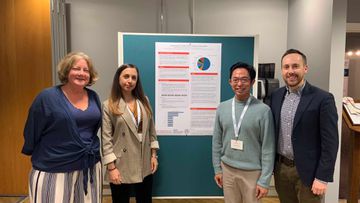Innovating Men's Health in MS: A Dedicated Clinic Model
Multiple Sclerosis (MS) affects approximately 2.8 million people worldwide, with men representing only 30% of cases. Despite this smaller proportion, men with MS (MwMS) often experience more aggressive disease progression, as well as increased stigma in accessing healthcare (Multiple Sclerosis International Federation, 2020). Their specific needs, particularly around sexual dysfunction, urological health, mental well-being, and lifestyle support are frequently underrecognized in standard MS services as MwMS tend to minimise physical complaints, may not report how MS impacts their daily activities, and may neglect to report changes in mood, cognition and sexual functions (Upton and Taylor, 2015). To address these gaps, we developed and piloted a dedicated men’s health clinic model at the National Hospital for Neurology and Neurosurgery (NHNN), University College London Hospitals (UCLH).
The service was designed as a multidisciplinary model integrating neurology, urology, psychology, sexual health, and wellness support. Referrals were accepted via neurologists, MS nurses, or patient self-referral. Patients underwent comprehensive assessments followed by tailored care plans and referrals to specialist services, and signposting and monitoring for further management.
A total of 11 male patients (mean age 41) participated in the clinic trial. The majority (82%) had relapsing-remitting MS, while 18% had primary progressive MS; all were on disease-modifying therapies. Most reported priority concerns include erectile dysfunction (3), fatigue (2), mood management (2), and reduced libido (2). Notably, 67% of these concerns had been raised in previous reviews, though some remained unaddressed. Following clinic attendance, 56% of participants were referred to specialist teams (including andrology, urology, fatigue, psychology, and vocational rehabilitation), while 38% received symptom education and management from MS clinical nurse specialists. Post-clinic surveys revealed that 54% of patients found the service helpful, and nearly half would not change its design.
This pilot demonstrates that a men’s health–focused MS clinic can capture underreported symptoms, enhance patient engagement, and improve access to appropriate care pathways. The findings support further development and implementation of dedicated, gender-sensitive service models to address the unique needs of MwMS.
Reference:
Multiple Sclerosis International Federation (MSIF) (2020). Atlas of MS, 3rd edition: Mapping multiple sclerosis around the world. MSIF London. Available at: https://www.msif.org/resource/... [Accessed 28 August 2025].
Upton, D. and Taylor, C. (2015) What are the support needs of men with multiple sclerosis, and are they being met? Int J MS Care. 2015 Jan-Feb;17(1):9-12. doi: 10.7224/1537-2073.2013-044. PMID: 25741222; PMCID: PMC4338643.

More MS Academy Comprehensive care Projects

Encouraging excellence, developing leaders, inspiring change
MS Academy was established in 2016 and in that time has accomplished a huge amount with exciting feedback demonstrating delegates feel inspired and energised along their personal and service development journeys. The various different levels of specialist MS training we offer are dedicated to case-based learning and practical application of cutting edge research.